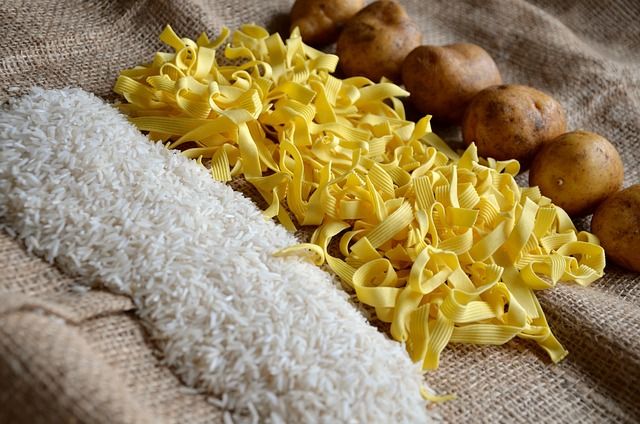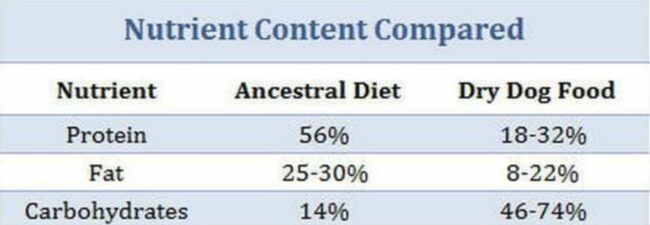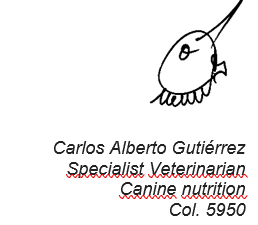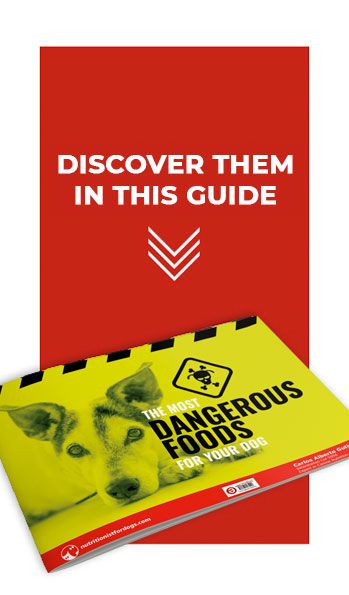
Let’s talk a little about carbohydrates in dogs. Are they necessary? Does a dog need pasta, rice and legumes in their diet? Essentially, no, but let’s delve into the topic, so you can learn a little more.
Carbohydrates are a type of nutrient produced by plants that provide energy when consumed. Foods rich in carbohydrates include fruits, honey and sugarcane, but also rice, corn, wheat, and grains in general. Unfortunately, most commercial dog foods also fall into this category.
There is no better source of energy for humans than carbohydrates. We were designed to metabolize and convert them into energy. The famous “carb-loading night” is when athletes consume a large amount of carbohydrates, such as pasta or rice, the night before a competition to maximize their performance the next day.
From this idea, some people incorrectly believe that dogs function in the same way. However, have you ever seen a lion, wolf, or coyote consuming large amounts of carbohydrates in the form of grains like corn, wheat, or rice? No. In nature, wild canines eat fruits and similar carbohydrate-rich foods when available, but it is not their primary source of energy.
To give you an idea of how serious the situation is, the vast majority of commercial dog and cat foods contain alarmingly high amounts of carbohydrates in the form of grains like corn, rice and wheat. Why is this the case? It’s quite simple: a kilogram of these grains is much cheaper than animal proteins such as beef, chicken, pork, fish, etc.
Take a look at this table to see how serious and alarming the situation is. “Ancestral Diet” refers to the diet that carnivores, like your dog, have eaten throughout their lives in nature, and “Dry Dog Food” refers to the infamous kibble. Notice the amount of carbohydrates.

Fortunately, we are increasingly seeing higher-quality foods available that are rich in moisture (80% water compared to 10% in kibble), high in animal protein, and low in carbohydrates.
Is a natural diet the best option?
Not always. If not done properly, it can still result in an excessive intake of carbohydrates.
Are carbohydrates bad for dogs?
As the physician Paracelsus once said: “The dose makes the poison.” Carbohydrates, as such, are not bad for your dog, but they cannot be the basis of their diet or their daily food intake, which is what happens when you feed them with commercial pet food such as kibble.
You should know that in nature, carnivores do consume some carbohydrates. But how do they do it? In different ways: They consume the intestines of their prey (usually herbivorous animals) that have fed on plants and fruits. Another way is through berries, grass, and herbivore feces. Notice that in none of these ways are they consuming excessive or daily amounts of carbohydrates like we do with processed foods or poorly prepared homemade natural diets.
It is beneficial to include some carbohydrates in our dogs’ natural diet, especially in the form of fruits and vegetables. It’s always good to vary the diet, and a little rice or pasta occasionally is not harmful. However, it cannot be the foundation of their diet, as it is not their primary source of energy.
So, what is the primary source of energy for a dog?
It is, unequivocally, fat, but we will discuss this on another occasion.
I’d like to conclude with a quote from a book which I highly recommend: “Give Your Dog a Bone,” by Dr. Ian Billinghurst, a pioneer in natural raw bone diets.
“Modern man feeds his dogs with these products from the standpoint of convenience and least cost. Dogs are not fed this way not because it is the best for them. In fact, not only does the dog not require starch and sugar to stay alive and be healthy, there is mounting evidence suggesting that modern starch and sugar-rich dog foods are hostile to their health.”
Click here and fill out the questionnaire if you want to start working together with us.
Best wishes.


